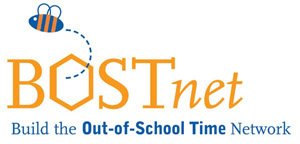
Situated within a conference room in the newer section of the Boston Public Library, the BOSTnet Roundtable series kicked off to a small audience. The date of the meeting happened to fall on the first day of school and of the many programs in the city and surrounding area. The people who attended were from all different types of program from music and arts to academic and legal aid. The majority of the attendees were familiar with BOSTnet events having attended them before. This was good since there was little need to introduce the organization and we could get right to the work at hand.
The presentation was an overview of Out-of-School time looking at how this environment was a unique developmental setting for youth and that programs needed to define themselves more against what they do rather than constantly be working to prove themselves in ares they have no control over (in school performance, family life, economic well being of the community). The key ideas seemed to go over well when we discussed the role of OST in the lives of children, the parameters of this work and the expectations, but one idea seemed to scatter common agreement and could have perhaps run rampant throughout the entire session: that was fun.
"Fun" was proposed as a central aspect of OST programming. Fun was learning academics in engaging ways, using art material, discovering musical talents, or having the much eroded "free time" educators are horrified to see young people have and it seems greatly assumed leads to immoral and depraved acts. (Not sure what these people did growing up two generations ago in the age of a great deal of free time... perhaps these fears are Freudian projections best skipped.) This was not the debut of "fun" but a second try at brining fun to the table. The last resulted in a great deal of wasted time in a training as staff argued that it was not "fun" but "safety" that was the central core of their program.
Safety?!
I mean... we engage in certain activities not to use the safety devices, but to enjoy them or to have fun. When have you gone to dinner and said, gee, I hope this meal I have will be safe? Or, "we went to this little French Bistro. My goodness, the food there was soooooo safe." Seeing fun as such an alien concept is indeed sad, but these times fun is relegated to the dustbin of an unsafe world where children were left to their own devices or just ignored. Fun, in recent times, has gotten a bad reputation. It is considered something negative or immoral. The safety officer looking for the kids smoking in the bathroom because they are in there having fun. To many "fun" is "Hippie talk." It is sex, drugs, and rock-n-roll (good enough for the older generation, but bad for us, and terrible for our children).
Fun need not be a bad word. It should be the foundation of learning and engagement from early childhood on. The laughter of an infant discovering something. Fun need not be immoral activities nor achieving a constant state of "whee" driven by the ID, but that sustained fun of engagement, discovery, and exploration - the sort of fun that drives many scientists during long days and nights of research. The fun may also be enjoyment of socialization. The fun may also be the ability to play with others without the constant proctoring of time that contemporary adults seem to bring.
Seeing how OST works with children, this fun may indeed be "whee!" Children perhaps need more examples of healthy "whee!".




No comments:
Post a Comment